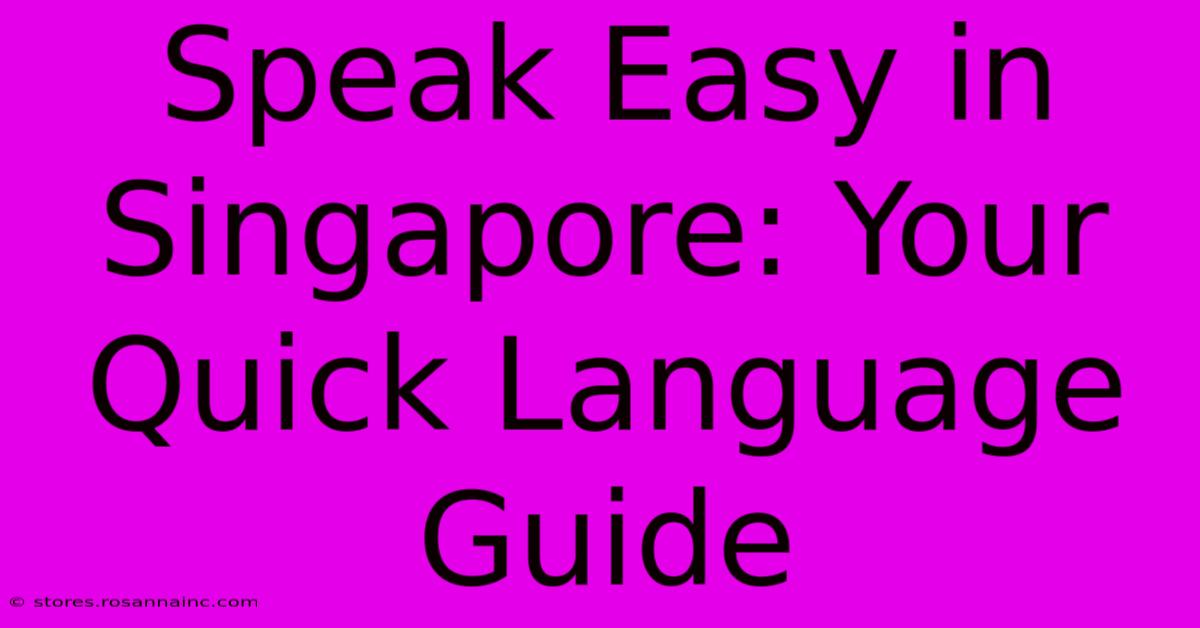Speak Easy In Singapore: Your Quick Language Guide

Table of Contents
Speak Easy in Singapore: Your Quick Language Guide
Singapore, a vibrant melting pot of cultures, boasts a fascinating linguistic landscape. Mastering the local lingo can significantly enhance your experience, unlocking deeper connections with the locals and navigating the city with ease. This guide offers a quick overview of the languages spoken in Singapore and essential phrases to help you "speak easy" during your visit.
The Official Languages: A Multilingual Metropolis
Singapore recognizes four official languages: English, Mandarin, Malay, and Tamil. Each plays a vital role in shaping the nation's identity and communication.
English: The Lingua Franca
English serves as the primary language of business, government, and education. While Singaporean English (Singlish) is widely spoken informally, standard English is used in formal settings. You'll find signage, menus, and official communications predominantly in English, making it easy to navigate.
Mandarin: The Dominant Chinese Dialect
Mandarin Chinese is the most widely spoken Chinese dialect in Singapore, reflecting the significant Chinese population. While understanding Mandarin isn't strictly necessary for tourists, knowing a few basic phrases can be a thoughtful gesture.
Malay: The National Language
Malay holds the distinction of being Singapore's national language, symbolizing its historical roots and cultural heritage. While less prevalent in daily interactions compared to English or Mandarin, its significance remains culturally profound.
Tamil: Representing the Indian Community
Tamil, representing the significant Indian community, is another official language. While less frequently encountered by tourists than the other three, it showcases the city-state's diverse linguistic tapestry.
Essential Phrases for Smooth Sailing
Even a few basic phrases can go a long way in enhancing your Singaporean experience. Here are some helpful expressions:
Greetings:
- Hello: 你好 (Nǐ hǎo) - Mandarin, 你好吗? (Nǐ hǎo ma?) - Mandarin (How are you?)
- Good morning: 早上好 (Zǎoshang hǎo) - Mandarin
- Good afternoon: 下午好 (Xiàwǔ hǎo) - Mandarin
- Good evening: 晚上好 (Wǎnshang hǎo) - Mandarin
- Thank you: 谢谢 (Xiè xie) - Mandarin, Terima kasih (Malay)
Common Phrases:
- Excuse me: 对不起 (Duìbuqǐ) - Mandarin, Maaf (Malay)
- Please: 请 (Qǐng) - Mandarin
- Yes: 是 (Shì) - Mandarin, Ya (Malay)
- No: 不是 (Bùshì) - Mandarin, Tidak (Malay)
- I don't understand: 我不明白 (Wǒ bù míngbai) - Mandarin
- How much is this?: 多少钱? (Duōshao qián?) - Mandarin
- Where is the...?: ...在哪里?(...Zài nǎlǐ?) - Mandarin (replace ... with the location)
Singlish: The Unique Singaporean English
Singlish, a unique blend of English, Mandarin, Malay, and Tamil, is informally spoken throughout Singapore. It's characterized by its distinctive grammar, vocabulary, and pronunciation. While not an official language, understanding Singlish provides a window into the local culture and adds a fun dimension to your interactions. Don't be afraid to pick up a few Singlish phrases—it shows you're making an effort! For example, "lah" is a common particle added to the end of sentences, softening the tone.
Beyond the Basics: Embracing the Linguistic Richness
Learning a few phrases in Mandarin, Malay, or Tamil can significantly enhance your interactions with locals. Singaporeans often appreciate the effort tourists make to communicate in their language, even if it's just a simple greeting. Embrace the linguistic diversity—it’s a key ingredient in making your Singapore adventure truly unforgettable.
SEO Optimization Tips for Your Singapore Trip
-
Keyword Research: Focus on keywords related to Singapore, language learning, travel phrases, and cultural experiences. Think about what someone searching for information about communicating in Singapore might type into a search engine. Examples: "Singapore language guide," "learn basic Singaporean phrases," "Mandarin phrases for Singapore," "Singlish for tourists".
-
Internal Linking: Link to other relevant articles on your website about Singapore travel, culture, or language learning.
-
External Linking: If appropriate, link to reputable sources providing further information about Singaporean languages or culture.
-
Image Optimization: Use relevant images related to Singapore and its culture, optimizing them with descriptive alt text containing your keywords.
-
Social Media Promotion: Share your blog post on social media platforms, using relevant hashtags like #Singapore, #travelsingapore, #languagesingapore.
By following these tips, you can improve your article's SEO and reach a wider audience of travellers planning a trip to Singapore. Remember to always write engaging and informative content that genuinely helps readers.

Thank you for visiting our website wich cover about Speak Easy In Singapore: Your Quick Language Guide. We hope the information provided has been useful to you. Feel free to contact us if you have any questions or need further assistance. See you next time and dont miss to bookmark.
Featured Posts
-
2025 Super Bowl Live Where To Watch
Feb 09, 2025
-
Mavericks Davis Suffers Setback
Feb 09, 2025
-
From Rye Lane To The Small Screen Explore David Jonssons Acting Prowess
Feb 09, 2025
-
Live Birmingham Vs Newcastle Fa Cup
Feb 09, 2025
-
Camillas Early Life Shaping A Queen Consort
Feb 09, 2025
